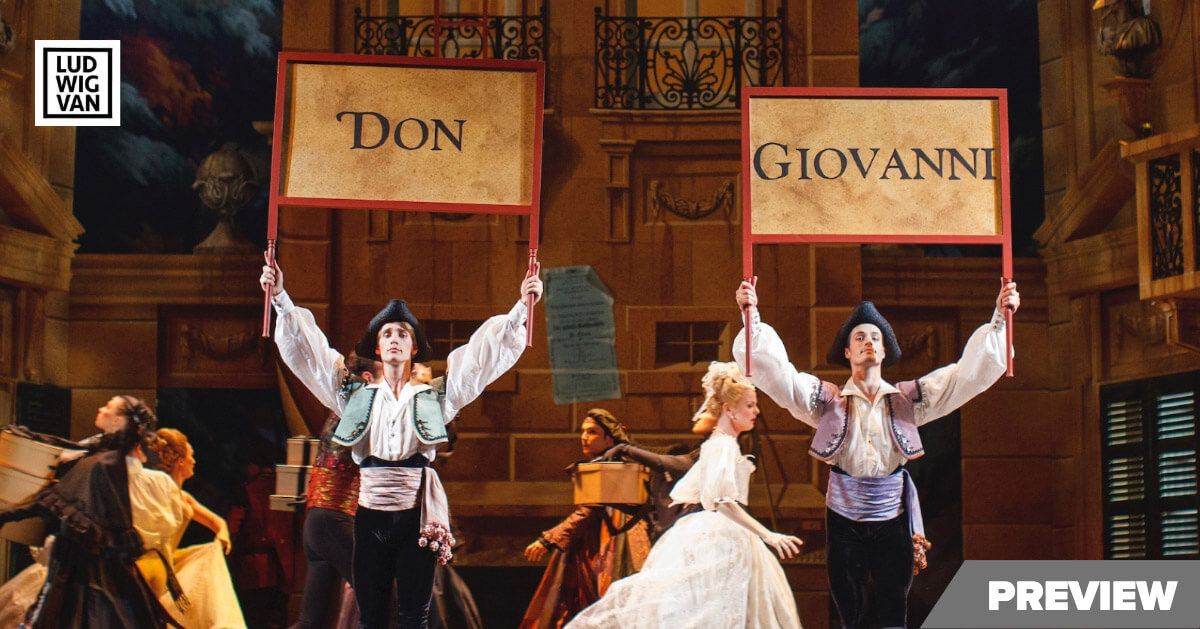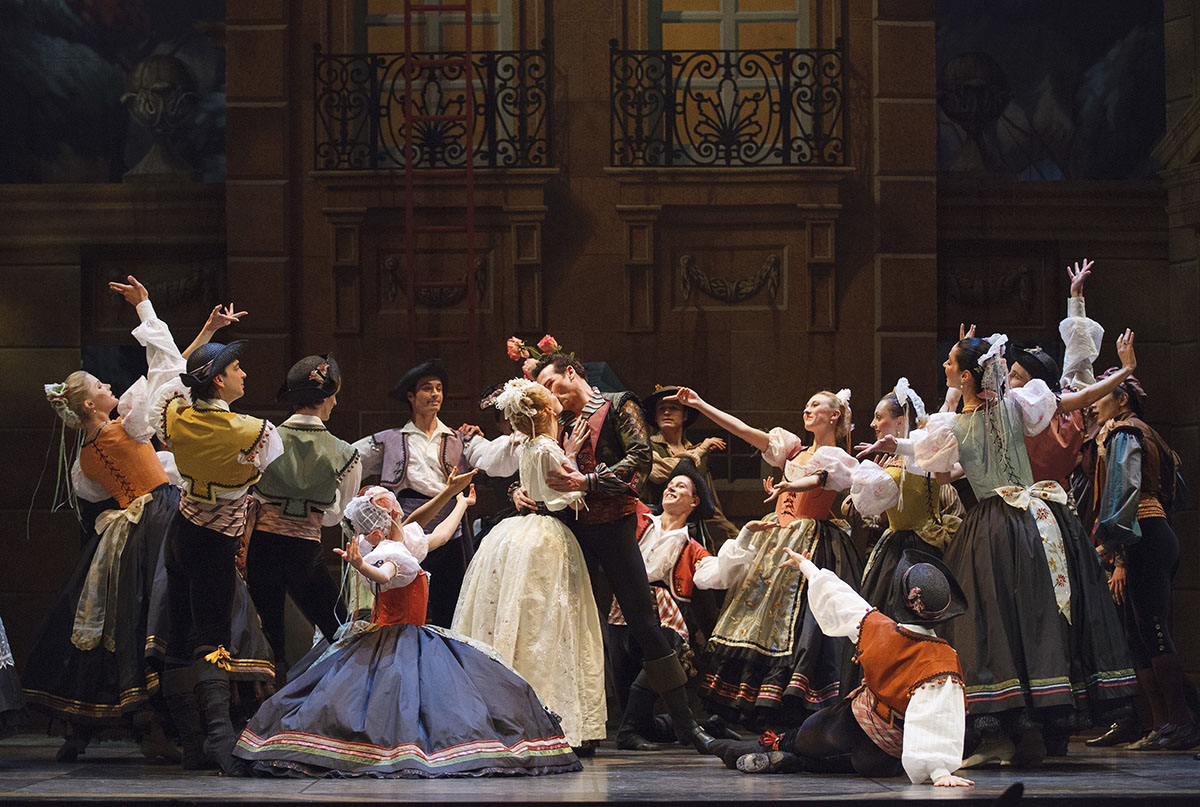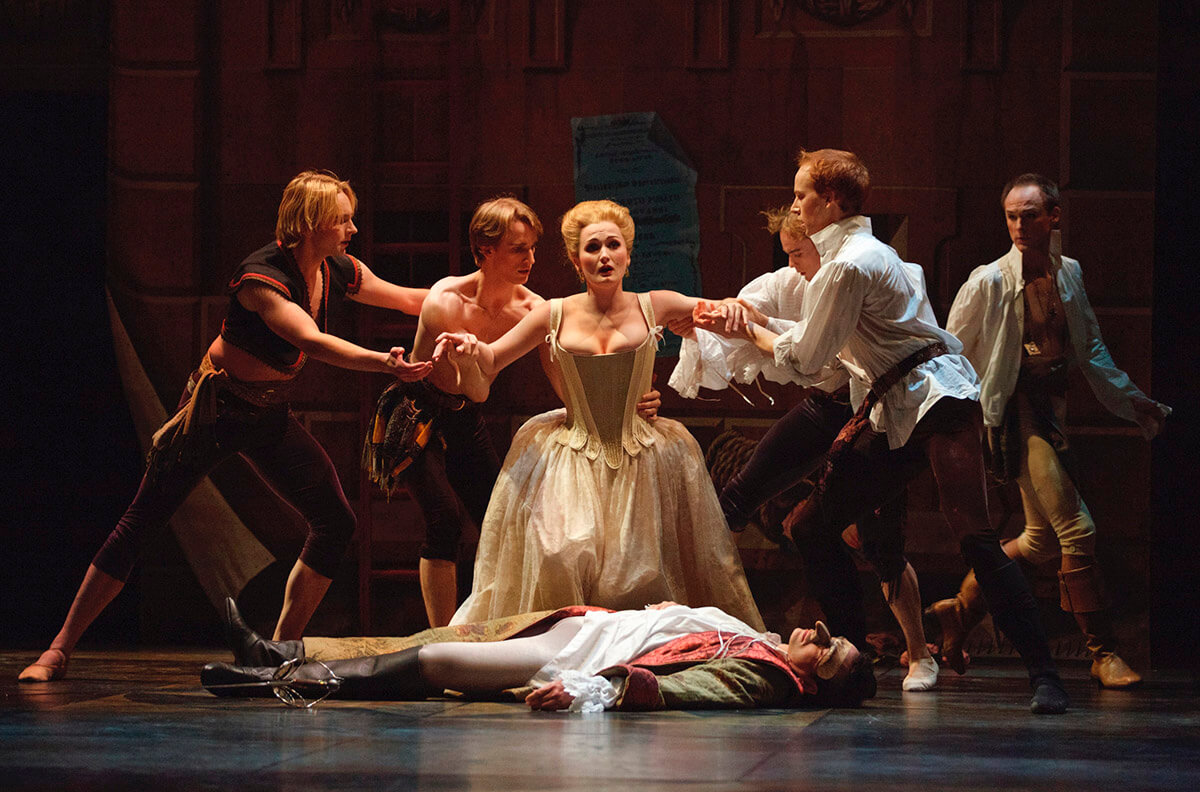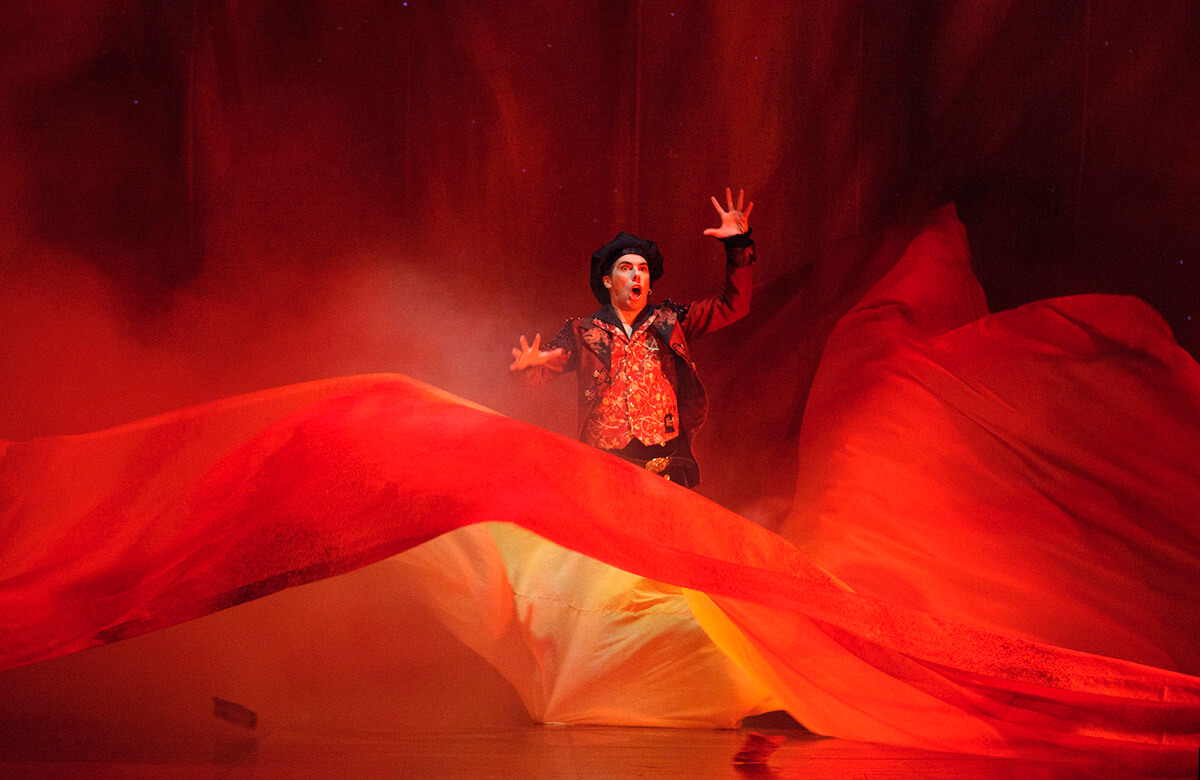
We often see certain things as permanent things, for instance, books, paintings, and plays, but are they? Is the operatic canon an unalterable, indestructible thing? If so, why are we compelled to witness these stories in repetition?
In the upcoming performances of Opera Atelier’s Don Giovanni, Marshall Pynkoski, Co-Artistic Director, seeks to present a story that is capable of growth — far from it being the relic of the past. Almost a decade has passed since their last Don Giovanni, and Marshall is eager to illustrate the evolution since 2011: “Douglas Williams – who many of our audience members will remember from Figaro and Idomeneo, will be singing his first Don… Carla Huhtanen who sang Zerlina for us a decade ago, will now sing her first Donna Elvira. I love to see our artists grow from one role to another as their voices change and develop, and as our ideas about the opera evolve.”
Along with blossoming artists, this production also marks the passing of Martha Mann Southgate, one of the best Canadian theatre designers and a long-time collaborator with the OA; this was Martha’s last major commission, and the opening night is dedicated to her.
David Fallis, Resident Music Director of OA, is a familiar face in town, as he is versed and engaged in a variety of different musical genres and groups in Toronto. With Mozart, David is always on the lookout for clues left in the scores: “I bring a certain amount of personal connection, but the score, music and tempo markings make things very clear… Mozart was a man of the theatre. He was always looking for more opportunities to write more operas as he was able to capture and show drama in music so brilliantly.”
What does he, a 21st-century person, think of Don Giovanni, a work under heavy scrutiny today for its plots and stereotypes? “A man who uses his position to deduce women was a well-known stereotype, common in the 18th-century. In a way, it’s a moral tale because he gets his comeuppance at the end,” says David, noting that female characters, however, are not simple dupes: “The most common uneven power dynamic is between Don and Zerlina… she is often portrayed as young ingénue, but we don’t play it that way. She’s very level headed and realistic — if she can flirt and get some money, she’ll do that.” And his view on these realistic feisty women is well-shared with the cast.

Carla Huhtanen is excited to present her first Donna Elvira. Donna Elvira’s trials, falling in love with Don, marrying him, only to be ‘ghosted’ just three days later, puts her in a peculiar position, especially when she runs into Don again in the garden. Contrary to the old stereotype of Donna Elvira, a foolish woman who cannot let go of this terrible man until the day the Hell opens up to claim him, Carla sees Donna Elvira as a proud, righteous and mercurial woman, who has perhaps found her equal in Don Giovanni: “Swinging from rage to utter devotion and back again, we feel her desperation. She is enraptured with this fellow, and with the idea of romantic love itself, that she becomes obsessed by both.”
Her dedicated pursuit of Don, despite the continuous suffering and fallen hopes, only proves her true strength in Carla’s mind: “An important thing to remember is Elvira’s sense of pride. Duty and love are important for her, and she feels entitled to pursue this man, because he made a promise to her. Despite his constant manipulation of her, he never gives an outright no to her. She is embroiled in his web once more, until she snaps out of it in the final scene. Don’t we see this on screens around the world daily from all people? It’s still a valid love story.”
Mireille Asselin, who is singing Zerlina, is literally on the roll; she’s recently finished a half-year of Don Giovanni in Garsington Opera (England) and the Théâtre des Champs Elysées in Paris, and during this time, even with her fair share of ‘boy-crazy roles,’ Mireille was challenged to look beyond her comfort zone: “I play a lot of young, spunky women on stage, but I really had to search outside of my comfort zone on how she and her fiancée Masetto revel in a tempestuous, confrontational relationship and this Canadian girl is incredibly uncomfortable with confrontation!”
Forced to define Zerlina, Mireille realized that there’s another challenge: what is in the mind of women who like being pursued? “If they like being pursued, how does it affect their other relationships and their sense of self-worth, and what is their agency in the situation? What do they choose and what is forced upon them?” And with such highest mastery of libretto and music, Mireille sees a wide range of possible interpretations available in Don Giovanni: “A choice that made sense in one production under the umbrella of one concept may not work at all in a different set of circumstances. In this production, Zerlina is much more calculating and an equal partner in the seduction. I find that fascinating. That’s what allows us all to come back to these masterpieces again and again, and find new things to say within the same old notes on the page.”

For Stephen Hegedus, this is his fifth Leporello, Don’s famous sidekick. Integral in Don’s irresponsible hedonistic pursuits — when things go pear-shaped, Leporello’s always there with a solution, arranging escapes, passing messages, confusing people; Leporello is the lubricant Don desperately needs in his reckless path. Is Leporello a good man or a bad man? Does, and should it matter?
Stephen, like Carla, sees much of the real world in shades of grey: “Leporello needs Don as much as Don needs him. He needs the work and the money… everyone can relate to this… you may hate the job or your boss, but you go to work anyway because you need to live. I do think, however, that Leporello needs the thrill of Giovanni as well. He is living vicariously through him. Real-life works in the same grey zone and art should as well, in my opinion.”
In the present, where the old life-time jobs are disappearing in lieu of gig-based economy, it’s Leporello who may be the closest to us now: “Da Ponte and Mozart based Leporello in reality. I think there are many people who rely on less-than-savoury characters to live. They do what they have to do to survive. On some levels, many of these people would relish the power and stature of their bosses.”
And what to make of Don Giovanni, the main man?
“He is a complex character who rages from liquid sensuality to brutal violence in the course of the opera, and I like finding my way to this role and the challenge of tracking his psychology,” says Douglas. First appeared in OA’s Figaro in 2017, Marshall and Douglas began to think about other roles with the Opera Atelier, and Douglas is happy to be back with the family: “It’s not entirely often as a freelancer that you have the feeling of ensemble with a cast, and this spirit is one reason why working for OA is so enjoyable. I’ve sung with everyone in this cast before, we enjoy each other, we know what the expectations are, and we get along very well.”
Douglas thought for months before arriving in Toronto this time, as the current elephant in the room for operatic canon is impossible to ignore, in particular regarding the subject of misogyny and inequality. And as these issues are inseparable from today’s audience, Douglas needed to decide on creating his Don:
“I’ve definitely drawn from my experience of living in Berlin, perhaps the most hedonistic city in the world, where I’ve seen people who come to devote themselves completely to consuming party culture. More is never enough, and the club becomes the only purpose to get through the week. And so it is with Don Giovanni. That’s the reason that his arias are so musically and dramatically inconsequential to the opera — he lives purely in action and experience, not in reflection. Sex, wine, party and anything physical, is life to him.
The challenge is to present him also as this sensual person, as someone who is legitimately enraptured by romance and honest about the way he lives. There’s a part of all of us who wants to live as largely as Don Giovanni does. He is the party and the passion at all times. His sincerity has to be clear to the audience, otherwise they will spend the opera only wanting to see him brought down. There has to be a way in for people to adore him, even if they are also waiting for his reckoning.”
Choosing to not participate in a morality play, Douglas sees his responsibility in bringing the character to life with all of his magnificence and darkness: “If I do a really good job, then some people in the audience will spend a moment of consciousness in their own glory, or their own shame, their own reflection on power, consumption, lust, or loneliness. I just hope I can create something believable and human.”

Don Giovanni, being such loved work, can also be laden heavy with cumulative anticipation and expectations. But do we actually know this opera? How well should we know it, and what does it mean to the persons who are about to embody it? Is it possible for these old favourite characters to be different? Or should we see this weird cautionary tale as a mere vehicle for glorious music and dance? Are we simply being lazy, when we plug ourselves into the comfortable, aged understanding of these characters and their struggles? Could this cast full of ideas and hot-blood make us look at this old story with a renewed curiosity?
Marshall has many favourite moments in Don Giovanni, but the most thrilling point is Don’s final confrontation with the Commendatore: “When the statue demands Don’s repentance, his refusal to repent is a truly a heroic moment. The Don has consistently been the most honest person on stage, and at his moment of refusal, he prefigures all the great anti-heroes. Mozart reflects the qualities in our lives that are timeless and allows us to confront things in ourselves that we love, that we dislike, and perhaps even confront qualities of which we are ashamed of. He accepts all of the unbearable sadness tied up with our being human beings and bravely confronts the human condition with humour, forgiveness and love.” And if we are willing to look beneath our own glossed surfaces, the demeanour of well-behaved, at-least-the-average person: reasonable well-adjusted and just-as-kind-as-anyone else, perhaps this story won’t feel so old anymore. The choice is up to you, and whichever choice you make, it will be accompanied by the superb storytelling of OA:
“Opera Atelier’s greatest strength as a company lies in our commitment to clear, intelligible storytelling. We only produce operas that we love, and only tell stories that are important to us. In this, I am in firm agreement with the great American director/writer David Mamet: ‘If you don’t love it, don’t touch it!’ … There could not be a more perfect introduction to opera than a production of one of Mozart’s masterpieces. They are as accessible as any Broadway musical, and we can guarantee that any audience member who attends will leave having been at the very least, hugely entertained and very possibly, deeply moved.”
Get your ticket, and be ready for a performance full of grand entertainment, OA style — brilliant costumes, staging, live orchestra and dancing — ohhh the dancing! This production restores all of the dances which Mozart included in his original production in 1787; for the Ballroom Scene, Jeannette Lajeunesse Zingg, Co-Artistic Director and Choreographer of OA, is using steps current in the theatre of Mozart’s day, putting on a simultaneous scene of minuet, a contredanse and a waltz, and OA’s focus on the comic aspect of this grande opera buffa promises to engage you from beginning to the end.
And perhaps, in the middle of all these glories… a hint of self-reflection? Or loads of Schaudenfreuden? Which will you find?
Opera Atelier presents Don Giovanni, October 31 — November 9, 2019, at Ed Mirvish Theatre. Details here.
#LUDWIGVAN
Want more updates on classical music and opera news and reviews? Follow us on Facebook, Instagram or Twitter for all the latest.
- CRITIC’S PICKS | Classical Music Events You Absolutely Need To See This Week: April 15 – April 21 - April 15, 2024
- SCRUTINY | Laurie Anderson Entrances A Sold-Out Koerner Hall With A Journey Down The Rabbit Hole - April 8, 2024
- CRITIC’S PICKS | Classical Music Events You Absolutely Need To See This Week: April 8 – April 14 - April 8, 2024



